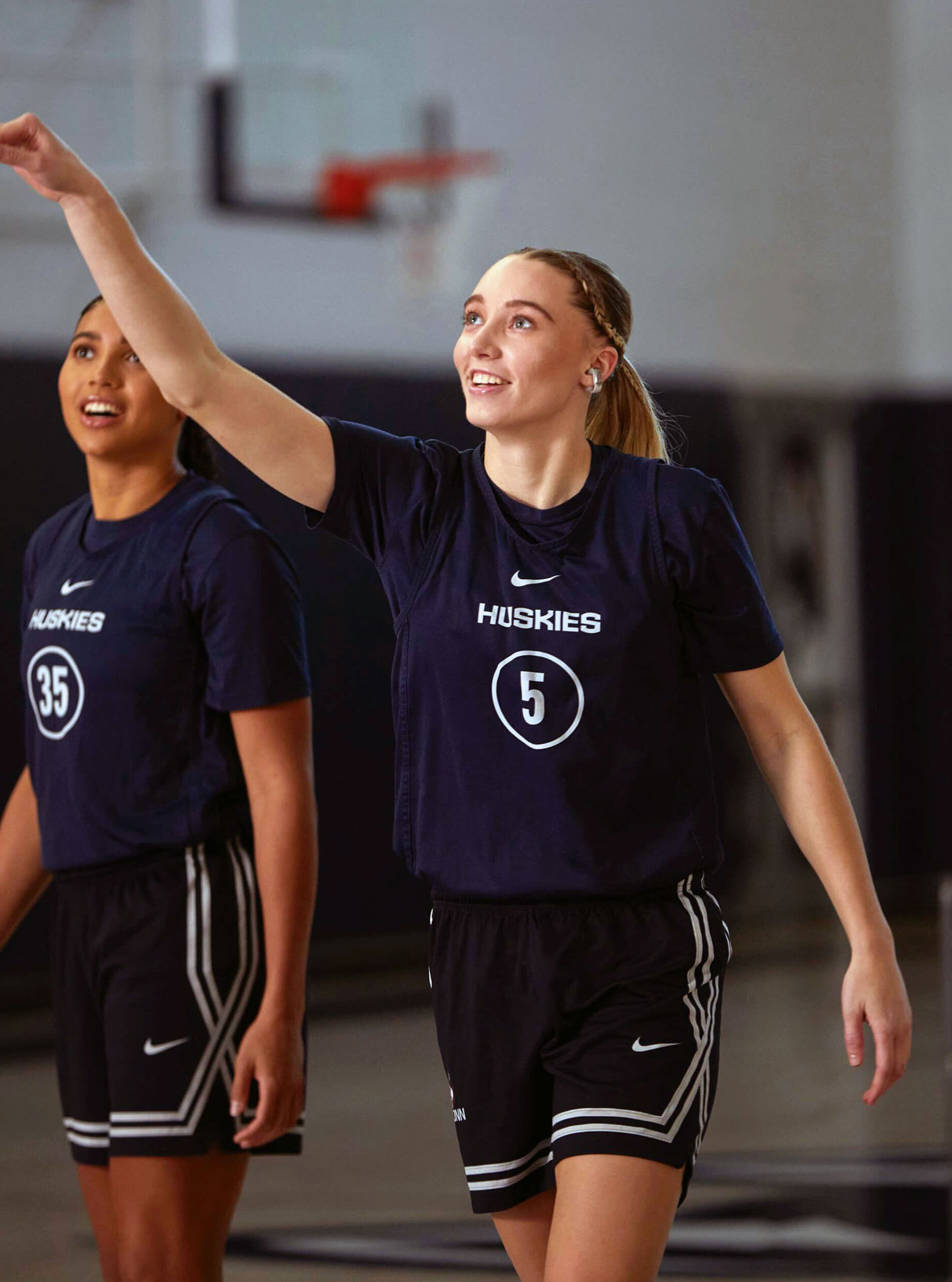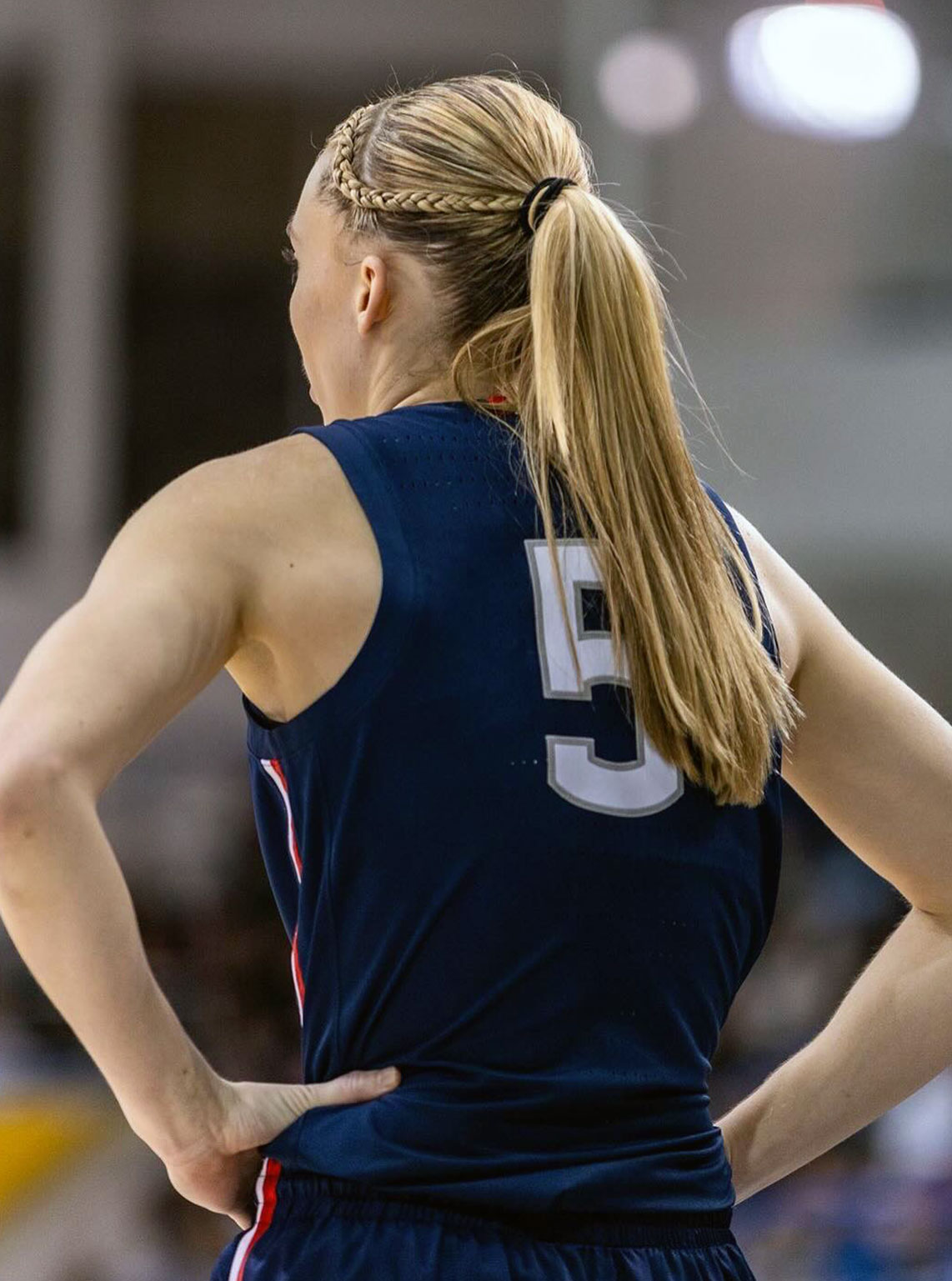Paige Bueckers & Caitlin Clark: Nude Rumors & Video Leaks?
Is the digital age fostering a climate of misinformation and exploitation, or is it simply a reflection of the human condition? The proliferation of unsubstantiated rumors and the spread of digitally altered content concerning public figures, particularly athletes like Paige Bueckers, are a stark reminder of the challenges in navigating the online world.
The internet, once hailed as a bastion of information and connection, has also become a breeding ground for speculation, gossip, and, in some cases, outright deceit. The rapid dissemination of content, coupled with the anonymity afforded by the digital realm, has created an environment where truth is often obscured, and individuals can be easily targeted. The recent online buzz surrounding Paige Bueckers, a rising star in the world of women's basketball, exemplifies this troubling trend. Numerous websites and social media platforms have been flooded with claims about "leaked" videos and explicit content allegedly involving the athlete, prompting a wave of concern and calls for responsible online behavior.
| Category | Details |
|---|---|
| Full Name | Paige Marie Bueckers |
| Date of Birth | October 20, 2001 |
| Place of Birth | Edina, Minnesota, USA |
| Nationality | American |
| Height | 6 ft 0 in (1.83 m) |
| Position | Point Guard |
| High School | Hopkins High School (Minnesota) |
| College | University of Connecticut (UConn) |
| Current Team | Dallas Wings (WNBA) |
| Major Achievements |
|
| Professional Career |
|
| Reference | WNBA Official Player Page |
The claims circulating online primarily revolve around the alleged existence of "leaked" videos and images of Paige Bueckers, often with the implication of explicit content. These rumors have gained traction across various platforms, including social media, and even on websites known for hosting adult content. It's important to note that, despite the widespread nature of these claims, there is no verified evidence to support them. The content itself, often described in vague terms, has not been substantiated by credible sources. Websites like s t a r x v i d e o and pornhub.com, among others, have been mentioned in connection with these claims, often promoting content with suggestive keywords designed to attract clicks and views. These sites frequently capitalize on trending topics and public figures to generate traffic, regardless of the accuracy or ethical implications of the content they host.
The dissemination of such rumors and potentially digitally altered content raises serious ethical concerns. It can be incredibly harmful to the individuals involved. Spreading unverified claims can lead to reputational damage, emotional distress, and even threats to personal safety. In the case of Paige Bueckers, a young athlete with a promising career, such rumors can undermine her hard work and dedication, overshadowing her athletic achievements. It is crucial to differentiate between genuine information and malicious attempts to exploit or defame someone.
Paige Bueckers' journey in basketball, from her days at Hopkins High School in Minnesota to her celebrated career at the University of Connecticut (UConn), has been nothing short of remarkable. As a point guard, she has consistently displayed exceptional skill, leadership, and a deep understanding of the game. Her accolades, including the Naismith College Player of the Year award, the John R. Wooden Award, and recognition as an All-American, are a testament to her talent and dedication. Currently playing in the WNBA, with the Dallas Wings, she continues to be a role model for aspiring athletes and a source of inspiration for fans worldwide.
The emergence of these rumors coincided with a time when explicit content was allegedly being circulated, involving other individuals in the public eye. These incidents underscore the potential for manipulation and the importance of critical thinking when encountering information online. Many of the websites and platforms promoting these alleged "leaks" are part of a larger network, often utilizing aggressive marketing tactics and questionable practices to generate profit. The content may be altered or fabricated, and the individuals involved may not have given consent. These activities highlight the need for greater awareness and vigilance in protecting personal privacy in the digital age.
The discussion regarding these claims is not only about the potential spread of false information but also about the ethics of online behavior. The act of creating or sharing content that is intended to harm, defame, or exploit another individual is both morally wrong and, in many cases, illegal. There are legal ramifications associated with non-consensual sharing of intimate images and videos, and it's crucial to understand and respect these boundaries. The spread of rumors and false allegations, regardless of their origin, can inflict lasting damage on an individuals reputation and mental well-being.
The social media landscape and many other digital platforms often lack the proper safeguards to prevent the spread of misinformation. There is no effective system to verify the authenticity of the content before it is shared. This can lead to the rapid dissemination of manipulated images, AI-generated content, and other deceptive materials. The lack of robust verification mechanisms places the onus on the users themselves to exercise critical thinking and to question the veracity of what they encounter online. It is imperative that social media companies and other platforms take greater responsibility in policing the content on their websites and in protecting users from malicious attacks.
In light of the controversy, Paige Bueckers herself took to social media to address the situation. Her message, which expressed gratitude for the outpouring of support, was a sign of strength and resilience in the face of unwarranted negativity. She also emphasized the importance of focusing on the achievements and contributions of athletes and individuals, instead of perpetuating baseless rumors. Her response sends a powerful message about the importance of personal integrity, resilience, and the ability to rise above unwarranted attacks.
The situation involving Paige Bueckers and the allegations against her have also highlighted the potential for exploitation and manipulation within the sports industry. The rise of social media and the increasing visibility of athletes have created new opportunities for those who seek to capitalize on their fame. It is also important to emphasize the importance of respecting privacy and the ethical boundaries associated with the consumption and sharing of digital content. The potential for misinformation and exploitation poses ongoing challenges, underscoring the importance of media literacy and critical thinking.
The spread of rumors about Paige Bueckers demonstrates how quickly unsubstantiated information can circulate online, particularly when associated with public figures. It is important to resist the urge to consume and share content without verifying its source and authenticity. Instead of fueling the spread of unverified information, consider seeking out reliable sources of news and information. Support the athlete by celebrating her achievements on the court, acknowledging her skills and commitment, and respecting her privacy.
This controversy should serve as a reminder of the power of empathy and responsible behavior in the digital age. Before sharing or commenting on content, one should always question its origin, the motives of those promoting it, and the potential impact on the individuals involved. Let us recognize the role that everyone plays in creating a more responsible online environment. By prioritizing accuracy, critical thinking, and respect for personal privacy, we can help mitigate the harmful effects of misinformation and ensure that the online world is a safer, more supportive space for everyone.
The trend of spreading rumors and potentially fabricated content about public figures, including Paige Bueckers, is not limited to any single platform. Numerous websites and social media channels exploit this vulnerability by posting content specifically designed to generate clicks and engagement. These sites may use clickbait headlines, sensationalized language, and even AI-generated content to lure viewers. The algorithms used by social media platforms often favor content that attracts clicks, thus amplifying the reach of unverified information.
In the context of this online discussion, the mention of websites like "s t a r x v i d e o" and others serves as a warning. The content available on these websites is often of questionable origin, and the individuals involved may not have given their consent. It is important to approach such sites with a high degree of skepticism and to be wary of any content that seems too sensational or implausible. The purpose of these sites is often to generate revenue through advertising, so the accuracy and ethical implications of the content are often secondary considerations.
The ongoing discussion about Paige Bueckers is ultimately a call for collective responsibility. Rather than becoming participants in the spread of rumors, individuals are encouraged to rely on credible sources. The best way to support an athlete is to celebrate their accomplishments, respect their privacy, and reject attempts to exploit or defame them. Promoting accurate information, critical thinking, and respect for personal boundaries are the best ways to create a safer online environment.
The attention on Paige Bueckers and similar situations underscores the broader need for media literacy. This means being able to evaluate the credibility of information, identify potential biases, and understand the various ways that content can be manipulated. It also means understanding the ethical implications of sharing and consuming digital content and recognizing the importance of protecting personal privacy.
As the online world evolves, so too must our approach to its use. We must be aware of the dangers and take steps to protect ourselves and others from the harmful effects of misinformation and exploitation. The case of Paige Bueckers serves as a reminder that the digital age, despite its many benefits, demands vigilance and a commitment to ethical online behavior.


